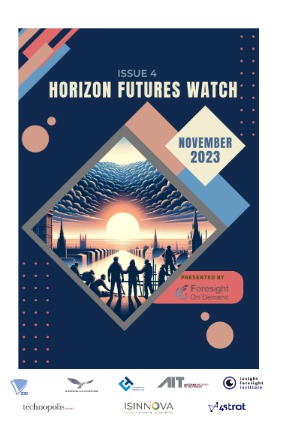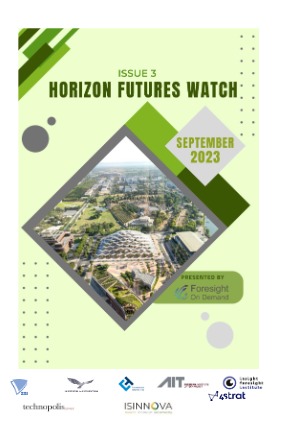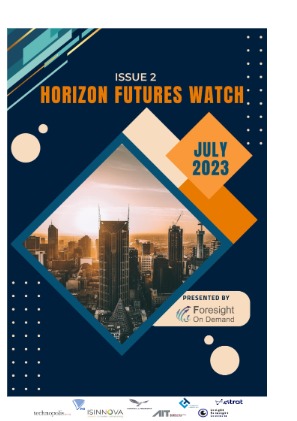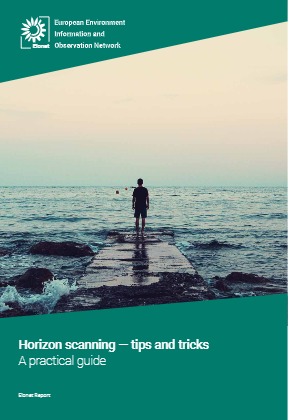The interpenetration of criminal and lawful economic activities is a pressing concern for policymakers and law enforcement agencies (LEAs). This intricate issue was the topic of the workshop that took place on Wednesday, 11 October 2023, as part of the series of online workshops hosted by the Horizon Futures Watch activities.
The interpenetration of criminal and lawful economic activities is a pressing concern for policymakers and law enforcement agencies (LEAs). This intricate issue was the topic of the workshop that took place on Wednesday, 11 October 2023, as part of the series of online workshops hosted by the Horizon Futures Watch activities.
The heart of the discussion, a policy brief stemming from the results of deep dives conducted on this topic, revolved around four scenarios, each offering a distinct perspective on the interpenetration of criminal and lawful economic activities highlighting the role of two competing groups: criminal actors and LEAs:
Neck to Neck Race: When the EU economy is thriving and law enforcement agencies have ample resources and capabilities, well-organized criminal groups are highly motivated to infiltrate lawful economic sectors. Through substantial resources, they create new technologies and methods to further integrate their illegal activities into the legitimate economy.
Criminal Paradise: In the absence of effective regulation, the EU’s strong economy creates favourable conditions for large, well-organized criminal groups to engage in profitable activities across lawful, questionable, and illicit sectors of the economy. Lawful businesses and citizens become potential victims, vulnerable to criminal activities.
Safe Haven for Legal Actors: Large criminal organisations have kept a minimal presence in the EU as they found ample, more profitable opportunities in other regions where LEAs are weaker, and regulation is ineffective. In the EU, law enforcement agencies are well-equipped with resources, skills, capabilities, and supported by effective regulations, making them strong and capable of maintaining law and order.
Protected Pockets: In this scenario, there are some ‘protected pockets’ for lawful economic actors. Large criminal groups focus their activities outside the EU where they can exploit more profitable opportunities to commit economic crimes. Small-scale criminal organisations take advantage of the low intensity of the large criminal organisations’ activities.
The scenarios considered various factors that drive individuals to engage in criminal economic activities, ranging from "push" factors, such as economic hardship, to "pull" factors, like lucrative opportunities. The scenarios explored the role of research, technological development, and innovation in creating opportunities for both criminal activities and prevention efforts by LEAs. The presentation of these scenarios opened the floor to insightful discussions regarding the brief's content and its potential consequences for European research and innovation (R&I) policies and regulations. The workshop's program featured two distinct roundtable sessions, bringing together experts and representatives from Horizon projects Aligner and EU-Hybnet.
The significance of four key policy implications outlined in the brief was stressed, including:
- Addressing the substantial challenges posed by the volume of data collected during criminal investigations and the information generated by regulatory requirements.
- The need for increased traceability to enhance transparency.
- The development of tools aimed at preventing, monitoring, and combating harmful criminal economic activities.
- The critical importance of building trust in state organizations, particularly law enforcement agencies.
The first roundtable discussion was a rich exchange of diverse perspectives and insights provided by the experts who authored the policy brief. Among the reactions, the pivotal role of supporting technological tools was emphasized to effectively prevent, monitor, and combat criminal economic activities within European Union Member States. Others highlighted the importance of establishing common ground in both policy and technology usability across various criminal justice systems within the EU. This sentiment was echoed by participants’ underlining the significance of fostering inter-state cooperation to address emerging challenges, including the spread of fake news and the links between climate change and different forms of criminal behavior.
It was pointed out that these scenarios did not include any mentions of the transformative changes associated with the Green Transition and Green Deal, which will have implications for illicit activities. The question of whether ecocide would be categorized as a crime in the future was posed. In addition, the complex connection between climate change and crimes, including human trafficking, migrant smuggling, and the dependence on illicit suppliers was brought forward.
The second roundtable discussion centred on the regulatory aspects of technology and its ethical implications. Project ALIGNER introduced the concept of technological neutrality, advocating that regulations should target harmful actions rather than the technology itself. She also emphasized the need for continuous evaluation of regulatory effectiveness and the flexibility to adapt them when required. Project EU-Hybnet underlined the ethical dimension of the debate, namely that it is important for technology regulations to align with democratic consensus and uphold the principles of the rule of law.
The "grey zone of legality" was also discussed, namely a situation in which the distinction between what is legal and what is illegal is not easily discernible. ALIGNER project’s team pointed out that similar tools, such as AI tools, can serve as assets for law enforcement agencies (LEAs), while also being potential means for criminal activities. There is a grey area in which these tools can be utilized on both sides, highlighting the difficulty in managing this ambiguity from a fundamental rights perspective.
The workshop’s scenarios and discussion carry significant implications for European research and innovation policies and regulations. By addressing the complex interplay between lawful and criminal economic activities, policymakers and stakeholders have the opportunity to contribute to the creation of a more transparent and secure environment for economic activities within the European Union.












